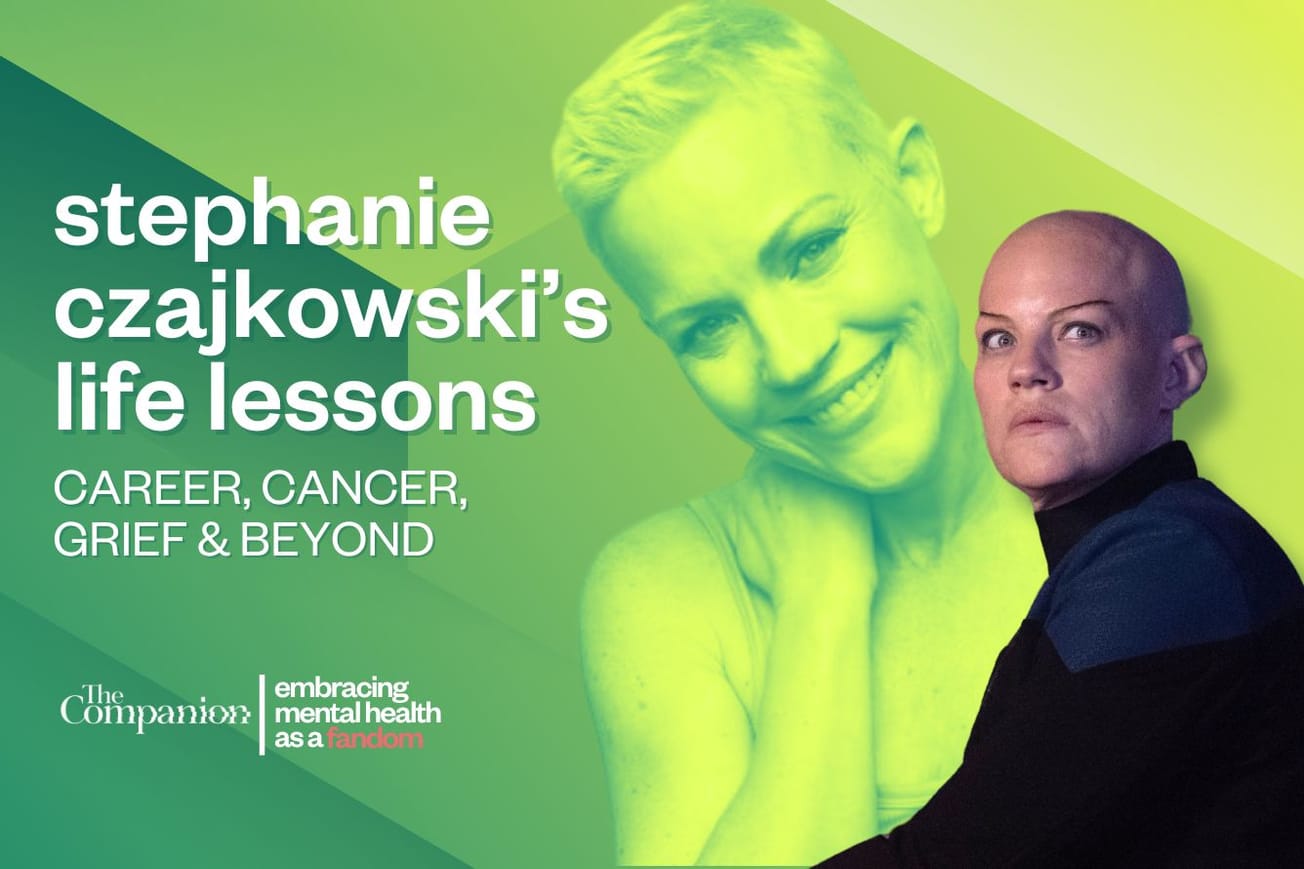In Star Trek’s nearly 60-year history, it’s wild to think it’s taken until 2022 for a Trek series or film to feature a female composer. Trek itself has such a rich musical tradition, from the groovy space-age sounds of Alexander Courage’s original theme to Jerry Goldsmith’s nautical bombast to the rich, full dynamism of Michael Giacchino’s score for the Kelvin-produced films.
But Israeli-born Nami Melumad, a longtime collaborator of Giacchino, now has the musical reins for two of Trek’s most recent (and most compelling) installments: the Nickelodeon-produced Star Trek: Prodigy, and the Pike-centric prequel Star Trek: Strange New Worlds. Working from main themes provided by Giacchino and Jeff Russo, respectively, Melumad has the singular challenge of incorporating those themes into musical worlds of her own — ones that differ dramatically in tone and medium. Star Trek: Prodigy is a sprightly, kid-friendly animated adventure with a group of misfits; Star Trek: Strange New Worlds is the standard-bearer for live-action Trek in all of its hope, idealism, and bright yellow outfits.
Around the airing of Strange New Worlds, I sat down with Melumad to talk about what it’s like to enter the world of Star Trek — her musical background, starting out with the ragtag crew of USS Protostar, and moving on to the thematic and musical flexibility required of Strange New Worlds’ throwback, episodic structure.
The Star Trek Journey Begins for Nami Melumad
Before we talk about Star Trek, I’d love to learn about your musical background. What was your intro to the world of music?
It’s really shallow, to be honest; there was this school band thing, and there was a cute boy there. [Laughs.] He played the euphonium, which is this small tuba. It was a woodwind, brass, and percussion band, and I wanted to join; that boy later became my boyfriend at 18 years old.
What was your first instrument?
My first instrument was the piano, because of my older sister! I always wanted to follow in her footsteps, whether liking the Backstreet Boys or anything else.
I can feel the Backstreet Boys’ influence in your Star Trek scores.
I should do it! [Laughs.] I mean, I can still sing the songs and play them on guitar. I love ‘90s and early 2000s music; it was melodic, and the bridges were always super nice. Anyways, I played piano and started in that school band. I played oboe, which is unique — it was not my choice, but the teacher thought I was stubborn enough to go with this and stick with it for two years. But I would always break the reeds, and my mom got sad.
So I moved to the flute, a metal instrument, so you can’t break it. [Laughs.] And I picked up the guitar because my cousin was playing guitar; he’s one of those charming guys who play the guitar, and I wanted to be like him.

How did you get started in composing? I presume you moved to LA to get into composing. Were some of your first major breaks with Michael Giacchino?
My first bigger break, yeah; my first real big break was with an Amazon show called Absentia, which is how I got into working with my current agency. My agent, Maria, is also Michael’s agent, so she introduced us for An American Pickle (2020). A lot of the stuff that happened later is all because Michael opened many doors for me, for which I’m super grateful.
Was he the one who opened the door for you with Star Trek?
He recommended me to Alex [Kurtzmann] for the Short Treks ‘Q&A’ (S2, Ep1), and they saw I can do some good stuff. So Alex proposed that Michael do the main theme for Prodigy, and then I’d do the rest. That formula worked well with the Pickle movie and Medal of Honor, so it made sense.

What was your exposure to, or familiarity with, Star Trek before the job?
I knew the music because growing up in Israel, it was in English, and TNG would always be on television. But no one else in my house would watch it. So whenever I saw it, it looked so weird — these weird people in their pajamas, you know. As far as I knew, there wasn’t a big audience for it in Israel.
But when I started developing an interest in film music, I encountered Jerry Goldsmith’s and Alexander Courage’s themes, and I was like, ‘whoa.’ Then I discovered Michael’s stuff later, and I was sold from a musical perspective. It was like Star Wars because these major sci-fi scores allow you to go for color, melody, and emotion. I’m still shocked that I get to be part of that legacy and continue it.
Once I started, I watched everything Star Trek by order of production, beginning with The Original Series and going on from there.
From Star Trek: Prodigy to Master
Going into Prodigy, you’re working on the incidental music around Giacchino’s central theme. Knowing his particular composing style and having the theme written for you, are there any challenges or opportunities you felt in the scoring process?
It’s not much of a challenge because I love Michael’s music. I feel like I’m trusted with something as good as that, so I have to make it good. I just think, “Oh, is he gonna watch this? Okay, it has to be great. He needs to be happy with how I use his theme.” We had this conversation early on because Michael wasn’t involved in the actual scoring, but I wanted to ensure we featured his theme when appropriate.
So we talked with the showrunners, Kevin and Dan Hageman, and Ben Hibon, the director. There, we settled on not putting the theme on all the time, just when the crew has their most triumphant moments or when it’s the most justified. We can’t overuse it; the characters have to earn it.
It doesn’t appear in the first episode, but in the second; the first time we hear it, I think, is when we see Protostar for the first time or when they start fighting to escape the colony.
That’s particularly felt in ‘Have a Nice Fight,‘ with that blast of the theme after the crew activates the phasers for the first time. It’s the triumph of overcoming a huge obstacle.
Yeah, and even in that first fight, this is when they first become a crew; that’s when they’re acting together to better their situation. But Michael’s theme worked seamlessly, and I think our styles are aligned that way. I can make it feel like it’s a part of the score because I grew up on his music, and he very much influenced my style.
Is there a non-Trek Giacchino score that’s high on your list?
I love Rogue One. And there’s Up, obviously, and The Incredibles, Inside Out, they’re all great. Super 8 is incredible.
I’m an enormous fan of his John Carter score.
When I was on the phone with the showrunners for Prodigy, they made me a Spotify list of things they listened to when they were working on the concepts and the scripts, and that score was on the list.

As Trek goes, the very concept of Prodigy is unique — not just because it’s animated, but because it centers around this ragtag group of misfits who aren’t even in Starfleet. They’ve essentially hijacked a Starfleet ship. I imagine that’s exciting from a musical perspective because you can shy away from the usual Trek beats.
You may have noticed, but in the pilot and the beginning of the season, the music’s not as Trek-y as the rest. Going a little further away was okay, so we can come in as viewers and learn what Star Trek is.
The show is basically about the main characters learning what Star Trek is! So that makes sense.
Exactly! And I was allowed to do that with the music, which was fun. The stuff I’m doing for the back half of the season is way more in line with the older Star Trek scores. Because they’re getting closer to the Federation, wearing the uniform, etc.

I’m curious whether you’ve adopted Michael’s penchant for cheeky track titles.
[Laughs.] I have, yeah. ‘Have a Nice Fight,’ and all that. I’m still bummed that Nickelodeon shut down [calling one track] ‘Thrust Me, I’m An Engineer.’ They’re like, “No, this is for kids, sorry!”
But Michael’s game is on point there, it takes me a while to come up with those things.
Exploring Strange New Worlds (Musically)
Let’s talk about Strange New Worlds, going from scoring a Trek show that is decidedly un-Trek at its beginning to something deeply baked into the classic series. What were some initial discussions about what this pre-Kirk Enterprise series would sound like?
Those came in the first spotting session with Henry [Alonso Myers], our showrunner, who’s an incredible leader. He’s like Pike, to be honest; he’s got the charm and the ability to make others work to do their best for him.
What I’d pitched to him was doing something that felt like the feature films — go broad, be melodic and emotional, and call back the original series’ style while being pretty different sonically. It’s not the same, but the way you’re scoring reminds the viewer of that sound.
I like doing the traditional stuff; it’s like going boldly backward. Many scores these days are a lot of atmospheres, and I just don’t know if that’s me.
That tracks with the history of Trek on TV, too; what I love about ‘90s Trek shows was that they had this rich musical tradition to continue. I remember hearing that Enterprise was one of the last shows of the aughts that still used full orchestra.
Those scores are very active, and I liked it. Maybe they’re a little too active for today’s standards, but I like the idea of a score being dynamic and shaping the scene and these climaxes. Not being afraid of emotion in scoring is good and helpful. And we have a 37-piece orchestra for this, which I’m grateful for. In Season 2, we will have a 55-piece orchestra, which is even better.

What logistical changes do you have to make when scoring, depending on the size of the orchestra you’re composing for?
If you have a smaller orchestra, you’ll want to compensate with other things “in the box” – that’s what we call the composing hall. It’ll be MIDI or samples, but when you blend with real instruments, those samples sound more real, especially with the right mixer. So for budgetary constraints, we can’t have percussionists in the room, for instance. Those percussionists end up not being live. You want to consider this stuff when writing. Or if you don’t have two flutes or four horns or something, you want to adjust accordingly.
And luckily, I’ve got great mixers. There’s Dennis Sands, who’s doing Avengers and Doctor Strange; this guy is the best. And our orchestrators, Jeff Kryka and Tracy Turnbull, beef things up in a way that I can’t do in samples alone.
Like with Prodigy, for Strange New Worlds, you’re working around a pre-existing theme, this time from Jeff Russo, that’s itself a restyling of the original Alexander Courage theme. At what point in the process did you get that, and what were your initial impressions of what the score should sound like based on that?
I got that pretty late in the process; I started doing sketches for stuff long before I heard something from Jeff. But it’s exactly the same as with Michael; I love Jeff and what he’s done with Picard, especially in this last season. But stylistically, we’re not quite in the same world as Michael and I are, so that was more challenging. Still, I got very inspired by how he incorporated all those old sounds, like the theremin and the percussion.
Our show is really fun, and it’s got this promise, and that theme was a good inspiration for how I should do it.

Another thing that makes Strange New Worlds stand out is that gee-whiz throwback to the ‘60s, where, unlike Discovery and Picard, we’re seeing a more episodic, mission-of-the-week structure. I presume there’s a lot of flexibility in the scoring process, where every episode is a new adventure.
Yes, the score goes to many different places in each episode. For instance, we meet that comet in Episode 2 [‘Children of the Comet’ – S1, Ep2], and the comet has its own melody. Every time we’re on the surface, there’s variation in the theme depending on what vantage point we’re viewing the comet from. Then you incorporate that notion into the existing material from the score, which constantly develops throughout time.
We didn’t score everything in order — we did Episode 3, then 2, then 1, and then everything else in order. It felt a little backward, but since it’s so episodic, you can develop individual sounds for each episode, so it didn’t matter as much.
I get to choose whatever synths go in, or feature a certain instrument, as we did on Vulcan. The colors of Vulcan are very interesting; the source music you hear in the restaurant where T’Pring is proposing to Spock was fun to compose because I had to think about how we treat Vulcans as a culture. Do we play the emotion of it? Because Vulcans hide their emotions. How do I bring in T’Pring and Spock’s theme? Is it a love theme? Is that what we’re going for? But I think that works because those feelings are there; they’re just repressed and inside.

And that episodic nature lets you play around with genre, too; Episode 1 is very much a traditional Trek adventure, Episode 2 is a bit more Motion Picture in its sense of mystery. Then some episodes are disaster movies, big space battles, or, God forbid, a farce in Episode 5, where a very familiar cue from TOS gets referenced.
Gerald Fried [who composed the score for TOS episode ‘Amok Time’ – S2, Ep1] is an exceptional composer. Jeff Russo had the actual score from The Original Series, and I took a look at it and thought, “This guy’s a genius!” While I was in the spotting session for [‘Spock Amok’ – S1, Ep5], I struggled to figure out how to make this cue better, it’s already so good.
And while the show is episodic, I love that the show lets the characters be, and we can grow with them through their arcs. Almost all of them have a backstory or a dilemma we’re dealing with, whether it’s Spock with T’Pring or M’Benga’s daughter — Uhura being uncertain whether she wants to be in Starfleet at all. I appreciate that style of writing because they interweave those storylines into whatever mystery or puzzle must be resolved that week.
Enterprising Young Men (and Women)
What was your approach to handling a lot of the main characters musically? Especially for, say, Pike or Uhura, who does read like the audience's perspective character.
There are motifs whenever I can feature them, just not for all characters. But it will happen for everybody when we see more of the backstory for these characters or an episode that features them. You’ll hear some themes first in Episode 3 that don’t come back until Episode 10. It’s very old-fashioned, in a sense, but the show is old-fashioned.
Were there any unusual instruments or sounds you hadn’t worked with before that you worked into this score?
The theremin was new, which I like adding to the Spock and T’Pring scenes because it made sense there. It’s an instrument that calls attention to itself, so you want to blend it in in a delicate way but still assert itself. For the most part, it was a traditional orchestra, with strings, brass, woodwinds, and harp, with a few extra things brought in for a particular episode. I want to do choir for Season 2, though.

How about Pike? He’s introduced in a very Western-inflected way, with the bombast and sweep that calls for. Was there a specific musical approach to him?
When we did the first spotting session, one of Henry or Akiva [Goldsman]’s notes was that they wanted the beginning to not feel like Star Trek. They wanted a cold sound, and the piano is an instrument that provokes a little distance if you play it sparsely on the higher range. So they wanted these first scenes to feel like a step back: is this Star Trek? Pike has a beard and a girl in a cabin!
Then when we have him riding a horse, that was the moment to get epic. Then, of course, April comes and recruits him, getting him literally back on the horse, which was cool.
I love that chase, when you see the horse and the shuttlecraft together, it’s so fun. That was a moment to go big but keep it away from normal Trek music. But after he starts getting into the ride, you hear a variation of his theme. And it comes back at the end of the episode where he’s accepted Enterprise as his home. It’s a theme that embodies hope and acceptance.
It’s very thematically relevant to the character, even in a metatextual sense for Pike’s dilemma — like him, we also know what will happen to him. What do you do with your life/a TV show when you already know the outcome? You find those moments of joy in the journey.
Right; like with Uhura, we already know what’s going to happen to her, we know she’s in Starfleet. But it’s really fun to see her as a cadet, a girl who’s not certain of what she wants, who doesn’t feel like she’s home yet. But she’s excited, so there’s this puppy energy that I love. I feel exactly like her.

And in Episode 2, she gets this real trial by fire, where she gets to experience the possibilities that come with exploration. She even contributes to the score by singing her way through that episode!
Celia Rose Gooding is a phenomenal actress but also a phenomenal singer. That was the first thing I did for the show because they had to have the music when they shot those scenes. They also wanted to have that strange variation of the Kenyan song in that episode when the computer plays it back through the alien translation. So I wrote all these chords that Celia and Ethan were singing.
That was fun. But I was also wondering how they were gonna do it. I remember reading the script and wondering how to handle diegetic music with score on top and how to balance it. You needed to feel like that comet was talking music. We had a similar concept in Prodigy Episode 7, too, and I was working on those at approximately the same time, which was interesting.
I just dig that sci-fi idea that music is a universal language, which Spock explains in that episode. It bridges the gaps between cultures; everyone can understand it.
This interview was first published on August 18th, 2022, on the original Companion website.
The cost of your membership has allowed us to mentor new writers and allowed us to reflect the diversity of voices within fandom. None of this is possible without you. Thank you. 🙂










